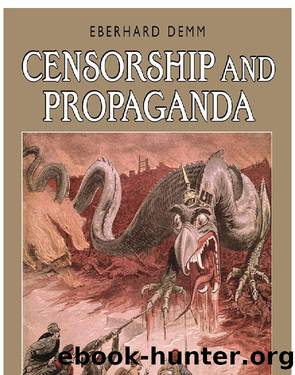Censorship and Propaganda in World War I by Demm Eberhard;

Author:Demm, Eberhard; [Неизв.]
Language: eng
Format: epub
Publisher: Bloomsbury UK
Chapter 7
Selected propagandists â eight profiles
Alfred Lord Northcliffe (Great Britain)
Winning the war became his mission.1
Born under the modest name of Alfred Harmsworth, but ennobled â in various steps from baronet over baron to viscount â Lord Northcliffe (1865â1922) was not only the most powerful newspaper tycoon of all war-faring countries who controlled around 40 per cent of the British dailies but also one of the most courageous personalities of the whole war. He consistently denounced the weaknesses and failures of the British war effort emphatically demanding from the government to cancel censorship and tell people the truth. Defying the censorsâ complete blackout on news from the battlefield, Northcliffeâs Daily Mail was the first paper to publish an unvarnished article about the hasty retreat of the British soldiers after the defeat in the Battle of Mons. To the great surprise of the journalists, the director of the PB, Fredrick E. Smith (later Lord Birkenhead), not only let the article pass but even made a favourable comment about it. This created a triple sensation: for the first time the public was informed about the desperate situation at the front; Smith was fired, but no disciplinary measures were taken against the newspaper or Northcliffe himself. It was probably this event that made him conscious of his great power, and he subsequently transformed all his papers, especially The Times and the tabloid paper Daily Mail, into a strong power factor in British politics with the unique aim to win the war at all costs (see motto above). Whenever the government accepted his views he would go along, if not he would attack it mercilessly. For instance, in harsh headlines such as âThe 22. A Conspiracy of Silenceâ the Daily Mail editorial of 19 October 1915 claimed that the 22 cabinet members were deceiving the people by their exaggerated suppression of news. For this acrimonious criticism, in all other belligerent countries Northcliffe would have spent the rest of the war in prison, but not so in Merry Old England where freedom was always respected when combined with power. The censors, however, complained time and again that despite the rights conferred to them by DORA they could do nothing against Northcliffe, because the political leaders were afraid to interfere with him. But it was also his personal skill and his talent for political intrigue which helped him along. Cleverly exploiting controversies inside the cabinet, the tycoon had the uncanny knack of playing off one cabinet minister against the other. For instance, allied with Lloyd George and the British General Sir John French, he reproached Kitchener of being responsible for the insufficient supply of shells and bombarded him with headlines in the Daily Mail such as âTragedy of the shells. Lord Kitchenerâs grave error.â Although he could not have Kitchener ousted, at least he had his way when in May 1915 Lloyd George was nominated Minister of Munitions and, after the death of Kitchener one month later, Minister of War. But Asquith remained prime minister and Northcliffe
Download
This site does not store any files on its server. We only index and link to content provided by other sites. Please contact the content providers to delete copyright contents if any and email us, we'll remove relevant links or contents immediately.
| Elections & Political Process | Ideologies & Doctrines |
| International & World Politics | Political Science |
| Public Affairs & Policy | Specific Topics |
| United States |
The Secret History by Donna Tartt(16627)
The Social Justice Warrior Handbook by Lisa De Pasquale(11489)
Thirteen Reasons Why by Jay Asher(7788)
This Is How You Lose Her by Junot Diaz(5774)
Weapons of Math Destruction by Cathy O'Neil(5037)
Zero to One by Peter Thiel(4824)
The Myth of the Strong Leader by Archie Brown(4789)
Promise Me, Dad by Joe Biden(4449)
Beartown by Fredrik Backman(4419)
Stone's Rules by Roger Stone(4416)
How Democracies Die by Steven Levitsky & Daniel Ziblatt(4399)
The Fire Next Time by James Baldwin(4343)
100 Deadly Skills by Clint Emerson(4079)
A Higher Loyalty: Truth, Lies, and Leadership by James Comey(4033)
Rise and Kill First by Ronen Bergman(4012)
The David Icke Guide to the Global Conspiracy (and how to end it) by David Icke(3883)
The Farm by Tom Rob Smith(3872)
Secrecy World by Jake Bernstein(3783)
The Doomsday Machine by Daniel Ellsberg(3731)
